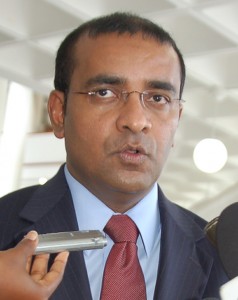The acceptance by the region of the Economic Partnership Agreement (EPA) with Europe in its present state is a reflection of a loss of the “passion, commitment and vision” which was so evident in Caribbean economic diplomacy during the decade of the seventies, according to former Commonwealth Secretary General Sir Shridath Ramphal.

“We are in effect saying that for this small gain from Europe we are prepared to abandon the bigger fight and that is a terrible level of acquiescence in defeat,” Ramphal told Stabroek Business in a recent exclusive interview.
“Our regional diplomatic effort has lost its direction. It has lost a clear-minded view of what needs to be done at the global level so that life can be better at the local level,” Ramphal said.
The former Guyana Foreign Minister who is on record as saying that the EPA is “anti CARICOM and “anti the Caricom Single Market” told Stabroek Business that while Guyana and the rest of the Caribbean used to be part of the diplomatic effort by developing countries to seek to bring about changes in the global economic system that would benefit poor countries, the region can no longer be considered to be in the forefront of that effort. And according to Ramphal the Caribbean’s acceptance of the arrangements for trade and economic relations with Europe as reflected in the conditions set out in the EPA has come about “all because we think we perceive small gains in special deals.”
Ramphal, whose tenure as Guyana’s Foreign Minister during the decade of the seventies helped shape the local and regional diplomatic effort in the call by developing countries for a New International Economic Order told Stabroek Business that the vitality of the Caribbean diplomatic effort during that period lay in our capacity “to develop and sustain a vision” and “to encourage our colleagues who had a greater clout to pursue a path that would lead to the amelioration of the terrible division, the gap between rich and poor.” And according to Ramphal the “slowing down” of the regional diplomatic effort in the subsequent years has derived from “a policy shift at the level of the political directorate of the entire region.”
Meanwhile the former Commonwealth Secretary General has said that the capacity of the Caribbean Community (CARICOM) to contribute to the strengthening of the regional diplomatic effort is being hindered by concerns among the regional political directorate about surrendering sovereignty. According to Ramphal Caricom Heads of Government had “choked” on the central recommendation of the West Indian Commission in 1992 “which was the establishment of an executive authority at the centre to be responsible for decisions taken by those Heads of Government.”
And according to Ramphal the subsequent “alternatives and make-do arrangements” which have been put in place “to respond to the need that the Commission had identified” have all failed. “The Bureau of Heads of Government is not an effective arrangement for the integration of Carib-bean economies or even of the cooperation of Caribbean countries,” Ramphal said.
Commenting on the arrangement within the regional movement that allocates subject portfolios to individual Heads of Govern-ment Ramphal said that that arrangement had been “a total failure” because Heads of Government “are very busy people with what they are doing in relation to the domestic agenda so that Caricom becomes something on the side and once it becomes something on the side it has no capacity to sustain itself; so that Caricom has gradually slipped from the centre, moved away from the centre of our lives,” Ramphal said.
According to Ramphal while regional Heads of Government have long recognized the need to review the manner in which Caricom works, they are contemplating that process of reform “with blinkers on.” He said that the process of change was being pursued by regional leaders against the backdrop of anxieties concerning possible consequential changes in the status quo. According to Ramphal this approach is reflective of “a built-in contradiction” which “seeks to make radical changes to improve our condition” without making any fundamental changes to the status quo of power.
Asked to comment on the impact of the Caricom Single Market on the region’s efforts to realize economic integration and to advance the economic interests of member countries and their citizens Ramphal said that he believed that “West Indians in the streets” have a sense that it is not working at all. “It isn’t changing their lives in any way and through that they lose confidence in the political directorate,” he added.





